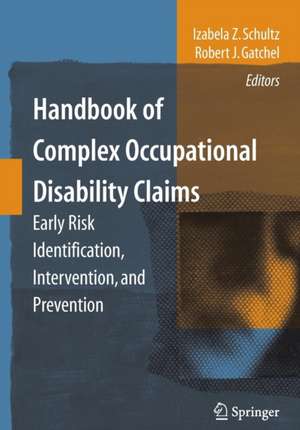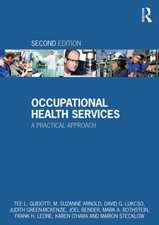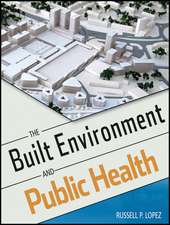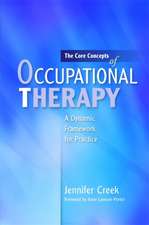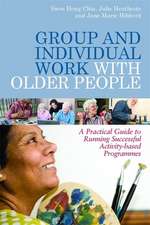Handbook of Complex Occupational Disability Claims: Early Risk Identification, Intervention, and Prevention
Editat de Izabela Z. Schultz, Robert J. Gatchelen Limba Engleză Paperback – 13 noi 2008
A book that synthesizes so many diverse viewpoints has the potential to influence both policy and practice across disciplines and cut through politicization of these still poorly understood conditions with evidence. The Handbook is important reading for all clinicians, professionals, and members of rehabilitation and disability management teams, across healthcare, occupational and compensation settings.
| Toate formatele și edițiile | Preț | Express |
|---|---|---|
| Paperback (1) | 1117.65 lei 6-8 săpt. | |
| Springer Us – 13 noi 2008 | 1117.65 lei 6-8 săpt. | |
| Hardback (1) | 1125.88 lei 6-8 săpt. | |
| Springer Us – 28 iul 2005 | 1125.88 lei 6-8 săpt. |
Preț: 1117.65 lei
Preț vechi: 1176.47 lei
-5% Nou
Puncte Express: 1676
Preț estimativ în valută:
213.89€ • 232.25$ • 179.67£
213.89€ • 232.25$ • 179.67£
Carte tipărită la comandă
Livrare economică 22 aprilie-06 mai
Preluare comenzi: 021 569.72.76
Specificații
ISBN-13: 9780387893839
ISBN-10: 0387893830
Pagini: 566
Ilustrații: XV, 566 p.
Dimensiuni: 178 x 254 x 30 mm
Greutate: 1 kg
Ediția:2009
Editura: Springer Us
Colecția Springer
Locul publicării:New York, NY, United States
ISBN-10: 0387893830
Pagini: 566
Ilustrații: XV, 566 p.
Dimensiuni: 178 x 254 x 30 mm
Greutate: 1 kg
Ediția:2009
Editura: Springer Us
Colecția Springer
Locul publicării:New York, NY, United States
Public țintă
Professional/practitionerDescriere
Chronic back and neck pain. Whiplash. Fibromyalgia. Carpal tunnel syndrome. Intractable headaches. Depression. Anxiety and posttraumatic stress. Concussion. More than ever, the term workplace disabilities is synonymous with greater clinical and case management complexity and escalating personal, social, occupational and economic cost. Complex illnesses and injuries that defy a traditional medical management model continue to baffle medical, mental health, rehabilitation, compensation, corporate, and legal professionals despite new advances in diagnosis, prevention, and rehabilitation. The Handbook of Complex Occupational Disability Claims: Early Risk Identification, Intervention and Prevention cuts through the confusion by integrating current theories and findings into a state-of-the-art tool for critical thinking, decision making, and effective practice.
This clear-sighted, interdisciplinary and integrative volume goes beyond cataloguing symptoms or sorting legitimate from fraudulent cases—its emphasis is on early detection of risk and management to prevent injury from developing into long-term disability. Editors Schultz and Gatchel and their 49 expert contributors offer lucid evaluations of the scientific and clinical literature to repair the mind/body split that has traditionally defined this field: (1) Conceptual and methodological issues in the prediction of disability. (2) Biopsychosocial perspectives on the most prevalent disabling conditions, including chronic pain syndromes, repetitive strain injuries, depression, anxiety, traumatic brain injury, and posttraumatic stress disorder. (3) Application of clinical findings to the rehabilitation, disability management, occupational and compensation arenas, and return-to-work practices. (4) In-depth discussion of the relationship between impairment and work disability. (5) Specific evidence-based early intervention approaches for workers and patients at risk.
A book that synthesizes so many diverse viewpoints has the potential to influence both policy and practice across disciplines and cut through politicization of these still poorly understood conditions with evidence. The Handbook is important reading for all clinicians, professionals, and members of rehabilitation and disability management teams, across healthcare, occupational and compensation settings.
This clear-sighted, interdisciplinary and integrative volume goes beyond cataloguing symptoms or sorting legitimate from fraudulent cases—its emphasis is on early detection of risk and management to prevent injury from developing into long-term disability. Editors Schultz and Gatchel and their 49 expert contributors offer lucid evaluations of the scientific and clinical literature to repair the mind/body split that has traditionally defined this field: (1) Conceptual and methodological issues in the prediction of disability. (2) Biopsychosocial perspectives on the most prevalent disabling conditions, including chronic pain syndromes, repetitive strain injuries, depression, anxiety, traumatic brain injury, and posttraumatic stress disorder. (3) Application of clinical findings to the rehabilitation, disability management, occupational and compensation arenas, and return-to-work practices. (4) In-depth discussion of the relationship between impairment and work disability. (5) Specific evidence-based early intervention approaches for workers and patients at risk.
A book that synthesizes so many diverse viewpoints has the potential to influence both policy and practice across disciplines and cut through politicization of these still poorly understood conditions with evidence. The Handbook is important reading for all clinicians, professionals, and members of rehabilitation and disability management teams, across healthcare, occupational and compensation settings.
Cuprins
Introduction I: Conceptual And Methodological Issues In Prediction Of Disability 1. Do We Have a Disability Epidemic? J. Mark Melhorn, Jacob Lazarovic, and Wanda K. Roehl 2. Impairment and Occupational Disability in Research and Practice; Izabela Z. Schultz 3. Models of Diagnosis and Rehabilitation in Musculoskeletal Pain-Related Occupational Disability; Izabela Z. Schultz, Peter W. Joy, Joan Crook, and Kerri Fraser 4. Readiness for Return to Work Following Injury or Illness; Renée-Louise Franche and Niklas Krause 5. Prediction of Occupational Disability; Renée-Louise Franche, John Frank, and Niklas Krause 6. Musculoskeletal Injury; Anna Wright Stowell 7. Outcome Measures in Prediction of Occupational Disability; Peter Polatin, Richard C. Robinson, and J.P. Garofalo 8. Tailoring Psychosocial Treatment for Patients with Occupational Disability; Richard C. Robinson, Robert J. Gatchel, and Travis Whitfill II. Prediction Of Disability In Pain-Related And Psychologic Conditions A: Prediction Of Chronic Pain Disability 9. Determinants of Occupational Disability Following a Low Back Injury; Joan Crook, Ruth Milner, Izabela Z. Schultz, and Bernadette Stringer 10. Biopsychosocial Multivariate Predictive Model of Occupational Low Back Disability; Izabela Z. Schultz, Joan M. Crook, Jonathan Berkowitz, Gregory R. Meloche, Ruth Milner, and Qonagh A. Zuberbier 11. Whiplash and Neck Pain-Related Disability; Jerome A. Schofferman and Mary E. Koestler 12. Disability in Fibromyalgia; Akiko Okifuji 13. Musculoskeletal Disorders, Disability, and Return-to-Work (Repetitive Strain); I. Mark Melhorn and Eric M. Kennedy 14. Predicting Disability from Headache; Jonathan Borkum B: Prediction Of Disability After Head Injury 15. Prediction of Disability after Mild Traumatic Brain Injury; Nancy Canning and Ronald M. Ruff 16. Prediction of Vocational Functioning from Neuropsychological Data;Thomas J. Guilmette C: Prediction Of Disability After Psychological Trauma17. The Role of Individual Factors in Predicting Posttraumatic Stress Disorder; Marilyn L. Bowman 18. Posttraumatic Stress Disability after Motor Vehicle Accidents; William J. Koch and Joti Samra 19. Disability Following Posttraumatic Stress Disorder; Robert J. Sbordone 20. The Prediction of Occupational Disability Related to Depressive and Anxiety Disorders; William H. Gnam III: Application Of Disability Prediction In Compensation, Health Care, And Occupational Contexts 21. Secondary Prevention in Health-Care and Occupational Settings in Musculoskeletal Condition Focusing on Low Back Pain; Chris J. Main, Ceri J. Phillips, and Paul J. Watson 22. Biopsychosocial Factors in Complex Claims for Disability Compensation; Les Kertay and Thomas M. Pendergrass 23. Secondary Gains and Losses in the Medicolegal Setting; Jeffrey Dersh, Peter Polatin, Gordon Leeman, and Robert Gatchel 24. Evidence-informed Best Practices for Injured Workers at Risk for Disability at the Subacute Stage; Izabela Z. Schultz, Joan Crook, and Alanna Winter IV: Early Intervention With At-Risk Groups 25. Early Interventions for 'At Risk' Patients with Spinal Pain; Steven James Linton 26. Working with the Employer; Patrick Loisel and Marie-José Durand 27. An Early Screening and Intervention Model for Acute and Subacute Low Back Pain; John P. Garofalo, Rohert J. Gatchel, Nancy Kishino, and Alan M. Strizak 28. The CtdMAP™ Intervention Program® for Musculoskeletal Disorders; I. Mark Melhorn and Larry K. Wilkinson V: Where Are We Now And Where Are We Headed? 29. Research and Practice Directions in Risk for Disability Prediction and Early Intervention; Izabela Z. Schultz and Robert J. Gatchel Index
Recenzii
From the reviews:
"There is no doubt that skyrocketing disability claims are having a profound monetary and social impact on Western societies. Leading this explosion are the biopsychosocial disabilities that have proved elusive to standard modeling. Schultz and Gatchel have created a repository of new knowledge about these disabilities, with some practical suggestions on how to integrate this knowledge effectively into clinical, case-management, rehabilitation, corporate, compensation, and return-to-work practices. Albert Einstein is reported to have said that 'the significant problems we face cannot be solved by the same level of thinking that created them.' This book does an admirable job of presenting a new paradigm to better address this challenging problem."
Brian E.Grottkau, M.D., Massachusetts General Hospital, Boston, MA
Excerpted from The New England Journal of Medicine, August 31, 2006
"The Handbook of Complex Occupational Disability Claims... is a timely text that synthesizes a copious amount of research and clinical data pertaining to a number of poorly defined medical conditions into an authoritative tool for use in practice across multiple disciplines. It should be considered mandatory reading for clinicians, rehabilitation specialists, case managers, and other professionals involved in occupational disability cases and claims management."
Bruce A. Barron, Division of Occupational and Environmental Medicine, University of Rochester School of Medicine and Dentistry, Rochester, NY
Excerpted from the Journal of Occupational Rehabilitation
"An excellent text that is truly worthwhile in its scope, coverage and depth of information. The impetus for this handbook stems from the contention that the United States and other developed Western nations are in the midst of an epidemic. This epidemic is composed of escalating occupational disability and skyrocketing economic costs. … It admirably summarizes the literature on risk factors and reviews the programs developed … that intervene with the at-risk group. In terms of scope and level of comprehensiveness, no comparable text exists." (John A. Dooley, PsycCRITIQUES, Vol. 51 (8), 2006)
"There is no doubt that skyrocketing disability claims are having a profound monetary and social impact on Western societies. Leading this explosion are the biopsychosocial disabilities that have proved elusive to standard modeling. Schultz and Gatchel have created a repository of new knowledge about these disabilities, with some practical suggestions on how to integrate this knowledge effectively into clinical, case-management, rehabilitation, corporate, compensation, and return-to-work practices. Albert Einstein is reported to have said that 'the significant problems we face cannot be solved by the same level of thinking that created them.' This book does an admirable job of presenting a new paradigm to better address this challenging problem."
Brian E.Grottkau, M.D., Massachusetts General Hospital, Boston, MA
Excerpted from The New England Journal of Medicine, August 31, 2006
"The Handbook of Complex Occupational Disability Claims... is a timely text that synthesizes a copious amount of research and clinical data pertaining to a number of poorly defined medical conditions into an authoritative tool for use in practice across multiple disciplines. It should be considered mandatory reading for clinicians, rehabilitation specialists, case managers, and other professionals involved in occupational disability cases and claims management."
Bruce A. Barron, Division of Occupational and Environmental Medicine, University of Rochester School of Medicine and Dentistry, Rochester, NY
Excerpted from the Journal of Occupational Rehabilitation
"An excellent text that is truly worthwhile in its scope, coverage and depth of information. The impetus for this handbook stems from the contention that the United States and other developed Western nations are in the midst of an epidemic. This epidemic is composed of escalating occupational disability and skyrocketing economic costs. … It admirably summarizes the literature on risk factors and reviews the programs developed … that intervene with the at-risk group. In terms of scope and level of comprehensiveness, no comparable text exists." (John A. Dooley, PsycCRITIQUES, Vol. 51 (8), 2006)
Textul de pe ultima copertă
The Handbook of Complex Occupational Disability Claims: Early Risk Identification, Intervention and Prevention
Edited by Izabela Z. Schultz, University of British Columbia, Vancouver, BC, Canada
Robet J. Gatchel, The University of Texas at Arlington, Arlington, TX, USA
Chronic back and neck pain. Whiplash. Fibromyalgia. Carpal tunnel syndrome. Intractable headaches. Depression. Anxiety and posttraumatic stress. Concussion. More than ever, the term workplace disabilities is synonymous with greater clinical and case management complexity and escalating personal, social, occupational and economic cost. Complex illnesses and injuries that defy a traditional medical management model continue to baffle medical, mental health, rehabilitation, compensation, corporate, and legal professionals despite new advances in diagnosis, prevention, and rehabilitation. The Handbook of Complex Occupational Disability Claims: Early Risk Identification, Intervention and Prevention cuts through the confusion by integrating current theories and findings into a state-of-the-art tool for critical thinking, decision making, and effective practice.
This clear-sighted, interdisciplinary and integrative volume goes beyond cataloguing symptoms or sorting legitimate from fraudulent cases—its emphasis is on early detection of risk and management to prevent injury from developing into long-term disability. Editors Schultz and Gatchel and their 49 expert contributors offer lucid evaluations of the scientific and clinical literature to repair the mind/body split that has traditionally defined this field:
Edited by Izabela Z. Schultz, University of British Columbia, Vancouver, BC, Canada
Robet J. Gatchel, The University of Texas at Arlington, Arlington, TX, USA
Chronic back and neck pain. Whiplash. Fibromyalgia. Carpal tunnel syndrome. Intractable headaches. Depression. Anxiety and posttraumatic stress. Concussion. More than ever, the term workplace disabilities is synonymous with greater clinical and case management complexity and escalating personal, social, occupational and economic cost. Complex illnesses and injuries that defy a traditional medical management model continue to baffle medical, mental health, rehabilitation, compensation, corporate, and legal professionals despite new advances in diagnosis, prevention, and rehabilitation. The Handbook of Complex Occupational Disability Claims: Early Risk Identification, Intervention and Prevention cuts through the confusion by integrating current theories and findings into a state-of-the-art tool for critical thinking, decision making, and effective practice.
This clear-sighted, interdisciplinary and integrative volume goes beyond cataloguing symptoms or sorting legitimate from fraudulent cases—its emphasis is on early detection of risk and management to prevent injury from developing into long-term disability. Editors Schultz and Gatchel and their 49 expert contributors offer lucid evaluations of the scientific and clinical literature to repair the mind/body split that has traditionally defined this field:
- Conceptual and methodological issues in the prediction of disability.
- Biopsychosocial perspectives on the most prevalent disabling conditions, including: chronic pain syndromes, repetitive strain injuries, depression, anxiety, traumatic brain injury, and posttraumatic stress disorder.
- Application of clinical findings to the rehabilitation, disability management, occupational and compensation arenas, and return-to-work practices.
- In-depth discussion of the relationship between impairment and work disability.
- Specific evidence-based early intervention approaches for workers and patients at risk.
Caracteristici
Includes comprehensive in-depth discussion of costly “new wave” claims such as chronic pain, repetitive strain injury, depression, anxiety, and mild traumatic brain injuries
